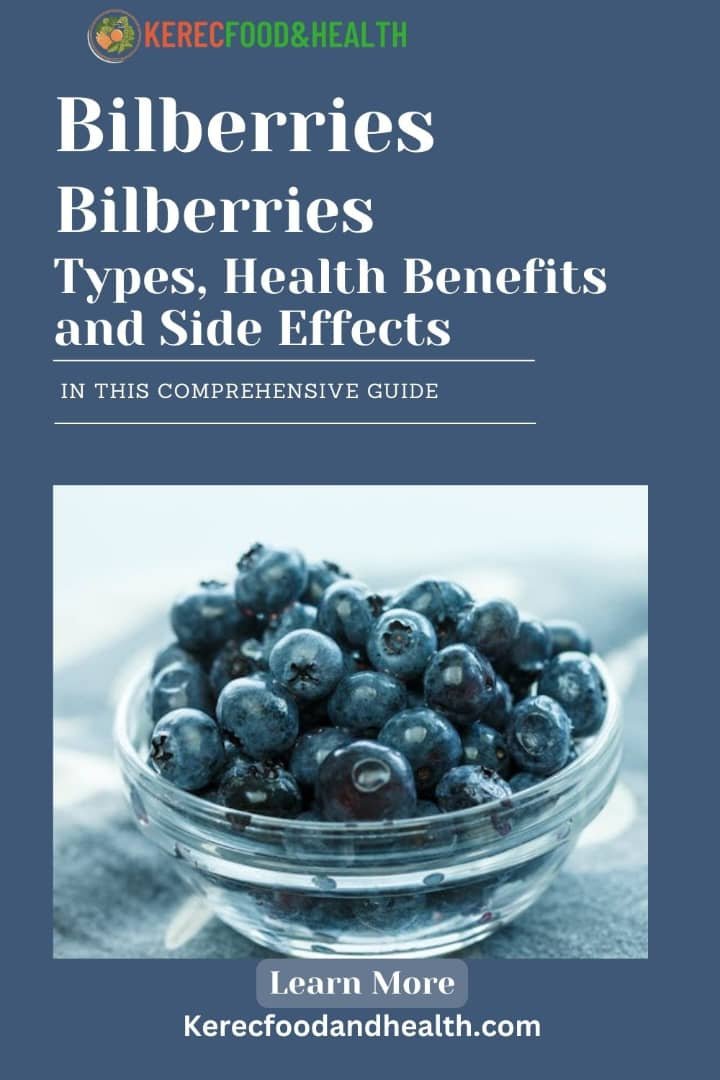Bilberries, often hailed as a superfood, are small, nutrient-dense berries that offer a wealth of health benefits. Packed with antioxidants, vitamins, and minerals, these little powerhouses can play a significant role in promoting overall wellness. As we delve into the nutritional profile of bilberries, you will discover how they can support eye health, reduce inflammation, and enhance heart health. However, it’s essential to understand that even superfoods may have side effects. In this blog post, we will explore the comprehensive nutrition of bilberries, examine their numerous health benefits, and discuss potential side effects to ensure you make informed choices about incorporating this berry into your diet. Join us as we uncover the remarkable qualities of bilberries and their impact on your health!
Bilberries (Vaccinium myrtillus) are not only tasty but also offer a wealth of nutritional benefits.
Nutritional Value of Bilberries (per 100g) of fresh bilberries
- Calories: 63
- Carbohydrates: 14.5 g
- Sugars: 10 g
- Dietary Fiber: 4.5 g
- Protein: 0.7 g
- Fat: 0.3 g
Vitamins:
- Vitamin C: 9.7 mg (approximately 16% of the Daily Value)
- Vitamin E: 0.6 mg (approximately 3% of the Daily Value)
- Vitamin K: 19.3 mcg (approximately 16% of the Daily Value)
- B Vitamins: Includes small amounts of B1 (Thiamine), B2 (Riboflavin), B3 (Niacin), B6, and Folate.
Minerals:
- Potassium: 77 mg
- Calcium: 18 mg
- Magnesium: 6 mg
- Manganese: 0.3 mg (approximately 15% of the Daily Value)
- Iron: 0.4 mg
In summary, bilberries are a nutrient-dense fruit that offers a range of health benefits. Their low calorie and high fiber content make them a great addition to a balanced diet, while their rich antioxidant properties help protect against various health issues. Whether enjoyed fresh, in smoothies, or as part of a dessert, bilberries can enhance both flavor and nutrition in your meals.
Top 10 Health Benefits of Bilberry: A Nutritional Powerhouse
Bilberries (Vaccinium myrtillus), often mistaken for blueberries, are small, dark blue berries that pack a significant nutritional punch. These berries have been used for centuries in traditional medicine due to their impressive health benefits. In this post, we will explore the top 10 health benefits of bilberries, highlighting why they should be included in your diet.
1. Rich in Antioxidants
To begin with, bilberries are loaded with antioxidants, particularly anthocyanins, which give them their vibrant color. These antioxidants play a crucial role in combating oxidative stress in the body. By neutralizing free radicals, bilberries help protect cells from damage and reduce the risk of chronic diseases.
2. Supports Eye Health
Moreover, bilberries have long been associated with eye health. Research indicates that the antioxidants in bilberries can improve night vision and may help prevent age-related macular degeneration (AMD). By promoting retinal health, bilberries can enhance overall visual function, making them beneficial for those concerned about their eyesight.
3. Improves Heart Health
In addition to their benefits for eye health, bilberries also support cardiovascular health. Studies show that regular consumption of bilberries can lower blood pressure and improve cholesterol levels. The anti-inflammatory properties of bilberries contribute to better blood vessel function, ultimately reducing the risk of heart disease.
4. Aids Digestive Health
Furthermore, bilberries are an excellent source of dietary fiber, which is essential for maintaining a healthy digestive system. Fiber promotes regular bowel movements and helps prevent constipation. Additionally, bilberries can support a healthy gut microbiome by feeding beneficial bacteria, further enhancing digestive health.
5. Regulates Blood Sugar Levels
Bilberries also play a role in regulating blood sugar levels. Their low glycemic index makes them a great choice for individuals with diabetes. Research suggests that bilberries can improve insulin sensitivity and help stabilize blood sugar levels after meals, making them a smart addition to a diabetes-friendly diet.
6. Enhances Brain Function
Another noteworthy benefit of bilberries is their potential to enhance cognitive function. Studies indicate that the antioxidants in bilberries may help protect the brain from oxidative stress and inflammation, potentially reducing the risk of age-related cognitive decline. Incorporating bilberries into your diet can support memory and overall brain health.
7. Boosts Immune System
Moreover, bilberries are rich in vitamins C and E, both of which are vital for a robust immune system. These vitamins help protect the body against infections and support overall health. By adding bilberries to your meals, you can naturally boost your immune defenses and improve your body’s ability to fend off illnesses.
8. Promotes Healthy Skin
Bilberries can also benefit your skin. The antioxidants found in these berries help protect the skin from damage caused by UV rays and pollution. Additionally, the anti-inflammatory properties of bilberries may help reduce skin irritation and promote a youthful complexion. Including bilberries in your diet can contribute to healthier, glowing skin.
9. Supports Weight Management
In addition to their many health benefits, bilberries can aid in weight management. They are low in calories yet high in nutrients, making them an excellent snack choice. The fiber in bilberries promotes feelings of fullness, helping to control appetite and reduce overall calorie intake. Including bilberries in your diet can support your weight loss or maintenance goals.
10. Improves Circulation
Finally, bilberries can improve blood circulation. The compounds in bilberries help strengthen blood vessels and enhance circulation, which is essential for delivering oxygen and nutrients throughout the body. Better circulation can lead to increased energy levels and improved overall health.
Conclusion
In conclusion, bilberries are a nutritional powerhouse with numerous health benefits. From supporting eye and heart health to aiding digestion and enhancing brain function, these small berries can have a big impact on your well-being. By incorporating bilberries into your diet, whether through smoothies, desserts, or savory dishes, you can enjoy their delicious flavor while reaping the benefits they offer. Embrace the power of bilberries and take a step toward better health today!
Side Effects of Bilberry: What You Need to Know
Bilberry (Vaccinium myrtillus) is celebrated for its impressive nutritional profile and health benefits, but like any natural remedy, it is essential to understand potential side effects. While many people can enjoy bilberries safely, certain individuals may experience adverse reactions. In this post, we will explore the possible side effects of bilberry, ensuring you are well-informed before adding this superfruit to your diet.
1. Allergic Reactions
First and foremost, some individuals may be allergic to bilberries. Symptoms of an allergic reaction can include itching, swelling, and difficulty breathing. If you have a known allergy to other berries or plants in the Ericaceae family, it is wise to exercise caution when consuming bilberries. Always consult a healthcare professional if you suspect an allergy.
2. Gastrointestinal Issues
In addition to allergies, bilberries can cause gastrointestinal discomfort in some individuals. This discomfort may manifest as bloating, gas, or diarrhea, especially if consumed in large quantities. To minimize the risk of gastrointestinal issues, start with small servings and gradually increase your intake to assess your body’s tolerance.
3. Interaction with Medications
Moreover, bilberries may interact with certain medications, particularly anticoagulants (blood thinners) and diabetes medications. The natural compounds in bilberries can affect blood clotting and blood sugar levels. Therefore, if you are taking medication for these conditions, it is crucial to discuss bilberry consumption with your healthcare provider to avoid any potential complications.
4. Potential Hypoglycemic Effects
Additionally, bilberries can lower blood sugar levels, which can be a concern for individuals with diabetes. While this property is beneficial for some, it may pose a risk for those on medication to manage blood sugar. Monitoring blood sugar levels after consuming bilberries is advisable, especially if you have diabetes or are taking related medications.
5. Pregnancy and Breastfeeding Considerations
Lastly, pregnant and breastfeeding women should approach bilberry consumption with caution. While moderate amounts are generally considered safe, high doses of bilberry supplements have not been extensively studied in these populations. As a result, it is best to consult a healthcare professional before incorporating bilberries or bilberry supplements into your diet during pregnancy or breastfeeding.
Conclusion
In conclusion, while bilberries are a nutritious addition to many diets, it is essential to be aware of their potential side effects. Allergic reactions, gastrointestinal issues, medication interactions, and considerations for specific populations should all be taken into account. By being informed and cautious, you can enjoy the numerous health benefits of bilberries while minimizing any risks. As always, consult a healthcare provider for personalized advice regarding your health and dietary choices.
Source
- https://www.webmd.com/vitamins/ai/ingredientmono-202/bilberry#:~:text=They%20might%20help%20reduce%20swelling,pressure%2C%20and%20many%20other%20conditions.
- https://www.healthline.com/nutrition/bilberry-benefits
- https://www.medicinenet.com/10_emerging_health_benefits_of_bilberries/article.htm
- https://draxe.com/nutrition/bilberry/
- https://www.nccih.nih.gov/health/bilberry
- https://www.drugs.com/mtm/bilberry.html





